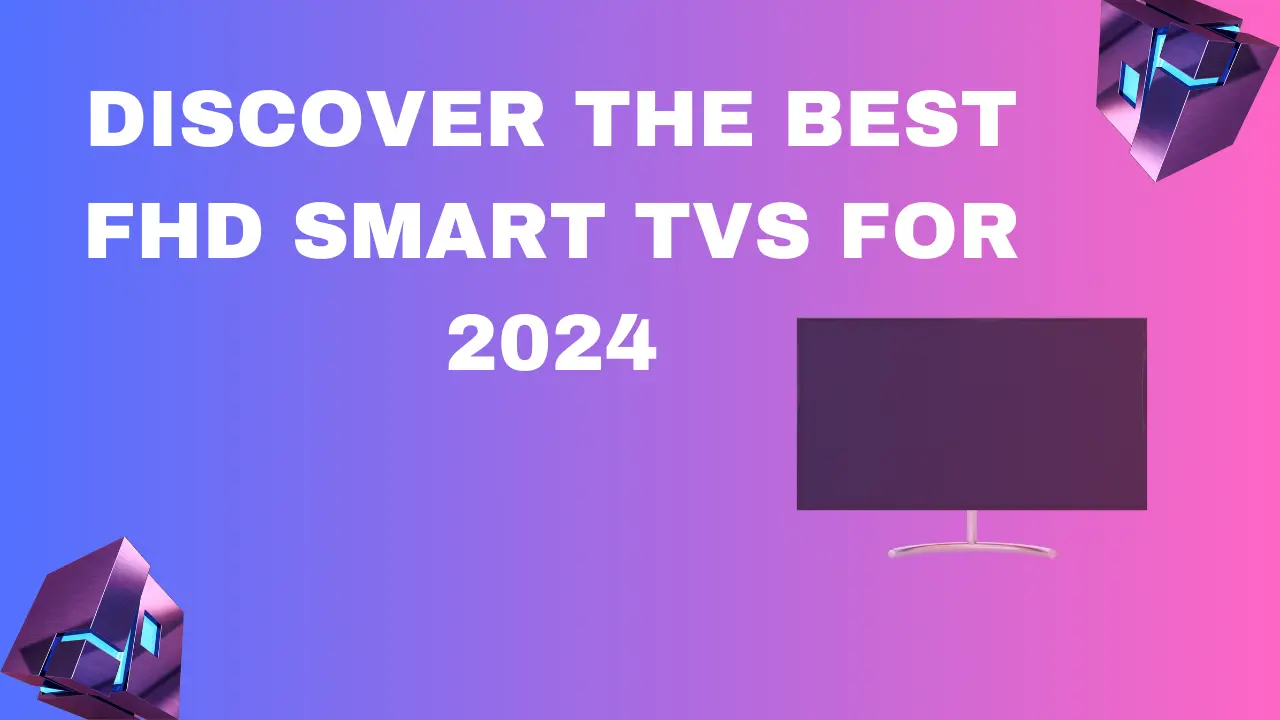
What is Smart TV?
A smart TV is a television set with built-in features that enable users to access online content, apps, and streaming services. Smart TVs are connected to the internet. Smart TVs can access a variety of content using WiFi or Ethernet connections in contrast to conventional TVs, which rely on cable or satellite transmissions.
Smart TVs often come with several functions, such as internet browsing, streaming of movies and TV shows, gaming, and social networking access. Several Smart TVs also include speech and gesture control, enabling users to use their voice or hand motions to navigate the interface.
How does a Smart TV Work?
An internet connection is required for a Smart TV to access online services and content. This is how it goes:
i) Internet Connectivity: An Ethernet or WiFi connection that is incorporated into a Smart TV enables it to connect to the internet.
ii) Operational System: The Smart TV features an operating system that functions much like a computer’s operating system on the TV’s CPU. The TV can run apps, browse the internet, and access online services thanks to the operating system.
iii) App Store: Similar to the app shops on smartphones and tablets, the Smart TV includes one as well. To access other forms of content, including streaming services, social media apps, and games, users can download apps from the app store.
Features of Smart TV
Users of smart Televisions may access a variety of materials and services because of the variety of capabilities that come with them. Following are a few typical attributes of smart TVs:
i) Internet Connectivity: Smart TVs come with Ethernet or WiFi built-in, allowing users to access online services and content.
ii) Operating System: Smart TVs come with an operating system that utilises the TV’s processor to run apps and provide access to web services.
iii) App Store: Similarly, to the app shops on smartphones and tablets, smart Televisions have their own. Users can download apps to access a variety of content, including social media apps, games, and streaming services.
iv) Image Quality: Smart TVs are available with a variety of image qualities, including HD, 4K Ultra HD, and even 8K.
v) Remote Control: Smart TVs come with a remote control that enables users to access various apps and services as well as navigate the TV’s user interface. Moreover, some Smart TVs provide speech and gesture controls, which let users operate the Screen using their voice or hand gestures.
Benefits of a Smart TV
Compared to conventional televisions, smart TVs provide a number of advantages. The following are some of the main benefits of utilizing a Smart TV:
- Internet Connectivity: A Smart TV’s ability to connect to the internet is one of its key advantages. This provides up a vastly expanded range of entertainment possibilities. Without the use of additional hardware, you can stream movies and TV shows from well-known services like Netflix, Amazon Prime Video, Hulu, and YouTube directly to your TV.
- Support for Apps: Smart TVs have built-in app shops or app platforms that let you download and set up a variety of applications. Your TV becomes a multipurpose device when you can access social media apps, news apps, weather apps, gaming apps, and more.
- Improved User Interface: Smart TVs have intuitive user interfaces that make for simple navigating. To operate and interact with the TV, you can use a remote control, voice commands, or smartphone apps. It’s simpler to find new shows or films thanks to the straightforward menus and suggestion tools that smart TVs frequently contain. These functions suggest material based on your viewing preferences.
- Integration with Other Smart Home Devices: Your smart home ecosystem can include smart TVs. You can operate your TV with voice commands thanks to their frequent support for voice assistants like Google Assistant and Amazon Alexa. To create a coordinated and immersive home entertainment experience, you can also connect your smart TV to other connected devices, such as smart speakers, thermostats, or lighting systems.
- Internet Browsing and Multitasking: These are both possible thanks to smart TVs that include built-in web browsers. Without switching to another device, you can access websites, read emails, or view online content. Even better, some smart TVs support multitasking, enabling you to browse the internet while watching a TV show or a movie.
Disadvantages of Smart TV
While smart TVs have many benefits, there are also some possible drawbacks to take into account. The following are some typical issues with smart TVs:
- Cost: When compared to conventional, non-smart TVs, smart TVs are typically more expensive. They require a larger initial commitment because of the greater price and additional features and technology. Some smart TVs may further demand additional memberships or premium services in order to access specific content, which can increase recurring expenditures.
- Privacy and Data Concerns: Since smart TVs are internet-connected, they can gather information about your watching interests, preferences, and even personal data. This information may be shared with outside parties or used to deliver customized advertisements. To make sure your data is handled properly, it’s crucial to read and comprehend the privacy rules of your smart TV and any linked apps or services.
- Security Hazards: Smart TVs are susceptible to security dangers just like any other internet-connected gadget. They may be vulnerable to malware, hacking, or unauthorized access if improperly secured. The software on your smart TV must be updated regularly, strong passwords must be used, and security measures must be taken to safeguard your network and linked devices.
- Complexity and Learning Curve: Smart TVs have more features, settings, and apps than standard TVs, which might make the user interface and experience more challenging. For individuals who are not accustomed to utilizing smart devices, it could take some time to become used to the functioning and navigation of the smart TV. Manufacturers do, however, frequently work to enhance user interfaces and make them more approachable over time.
- Limited Support: While smart TVs offer an ecosystem for apps, the availability of apps may vary based on the manufacturer and operating system of the TV. On some smart TV platforms, some apps or streaming services might not be supported or might have limited functionality. It’s critical to do your homework and confirm that the smart TV you want to buy supports the apps and services you frequently use.
What are the Different Types of Smart TVs?
The market is filled with a variety of different Smart TV models. Some of the varieties are listed below:
i) Smart LED TVs: The visuals displayed on the screen of these Smart TVs are produced using LED backlighting. They come in a variety of sizes, are energy-efficient, and have superb picture quality.
ii) OLED Smart TVs: The visuals on the screen of an OLED Smart TV are produced by organic light-emitting diodes. Although often more expensive, they provide superior colour accuracy, deeper blacks, and wider viewing angles than LED TVs.
iii) QLED Smart TVs: Quantum dots are used in QLED Smart TVs to improve the colour and brightness of the images displayed on the screen. Compared to LED Televisions, they provide higher colour accuracy but are typically more expensive.
iv) 4K Smart LED TV: TVs with a 4K smart resolution (3840 x 2160 pixels) give a resolution that is four times that of HD TVs. Although they are typically more expensive than ordinary HD TVs, they provide images that are very clear and detailed.
v) 8K Smart TV: The resolution of 8K Smart TVs is 7680 x 4320 pixels, which is four times higher than that of 4K Televisions. Although they provide visuals that are even crisper and more detailed than 4K TVs, they are currently highly expensive.
What does a Smart TV do that a Regular TV doesn’t?
A Smart TV has several functions and capabilities that a normal TV lacks. Here are some of the key variations:
i) Internet Connectivity: An Ethernet or WiFi connection that is incorporated into a Smart TV enables it to connect to the internet and access online content and services.
ii) Operating System: Just like a computer, a Smart TV’s operating system runs on the TV’s processor. The TV can run apps, browse the internet, and access online services thanks to the operating system.
iii) Streaming Services: Smart TVs can access a variety of streaming services that let viewers watch movies and TV shows on demand, including Netflix and Amazon Prime Video.
iv) Online Browsing: Smart TVs also come with built-in web browsers that let users visit websites and explore the internet.
Systems for Smart TVs: Android and Google TV
Two popular platforms on Smart TVs are Google TV and Android TV.
Android TV: It offers capabilities and is based on the Android operating system used in smartphones and tablets. Google Assistant is already included in Android TV, enabling users to search for content, manage playback, and access apps with voice commands.
Google TV: Google TV is a more recent operating system that can be found on some modern Smart TVs. With recommendations based on the user’s watching history and preferences, it is intended to provide a more individualised experience. Users can bookmark items they want to watch later using the “Watchlist” feature on Google TV. Many of the same features and functionalities are available on Google TV because it is also based on Android TV.
Factors to Consider Before Buying a Smart TV
Before buying a Smart TV, there are several factors you should consider to ensure you choose the right TV for your needs. Here are some things to consider:
i) Screen size: Take into account the size of the TV you require in relation to the size of your room and the viewing distance. A bigger TV can be preferable for a bigger room, whilst a smaller TV might be more suited for a smaller area.
ii) Resolution: Take into account the desired TV resolution. While 4K Smart TVs have a greater resolution than HD Televisions, they could also cost more.
iii) Connectivity: Take into account the TV’s various connectivity choices. Ensure it has Ethernet or WiFi connectivity built in so you can access the internet and online content.
iv) Operating System: Think about the TV’s operating system. Although popular choices like Android TV and Google TV exist, other manufacturers might utilise their proprietary operating systems.
v) Price: While selecting a Smart TV, take your budget into account. Depending on the brand, size, and features of the TV, prices might differ significantly. Wegaflix offers the best prices in the market.



